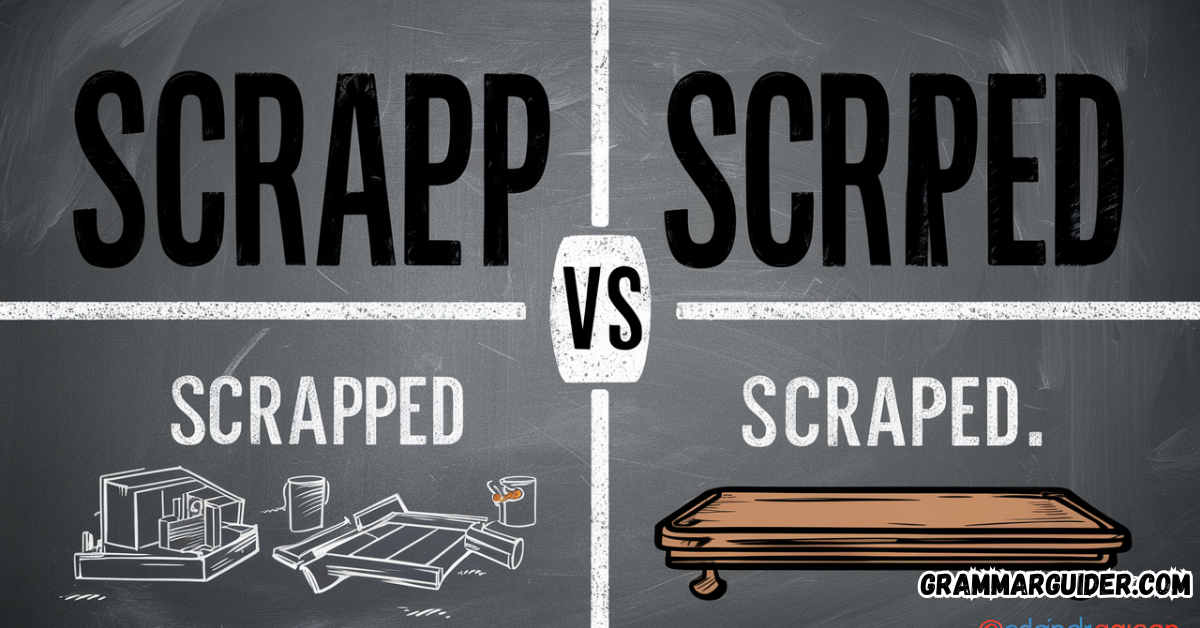If you’ve ever found yourself debating whether to use scraped vs scrapped, you’re not alone. These two words often cause confusion, even though they have distinct meanings and uses. To help you navigate this confusion, we’ll break down their definitions, how to use them correctly, and provide real-world examples in various contexts.
By the end of this article, you’ll have a clear understanding of the difference between scraped vs scrapped, and you’ll know when to use each one.
Understanding the Difference Between Scraped and Scrapped
At first glance, the words scraped and scrapped may seem almost identical. After all, they share similar roots and spellings. However, their meanings diverge significantly.
Scraped: A Removal Action
Scraped refers to the action of removing or collecting something by scraping. It typically involves a physical motion where an object is scraped off a surface, or something is removed through friction.
Examples of “Scraped”:
- “I scraped the last bit of peanut butter from the jar.”
- “She scraped the ice off her windshield before leaving for work.”
- “The workers scraped off the old paint before applying a new coat.”
In each of these cases, the action involves removal through a scraping motion.
Scrapped: To Discard or Abandon
On the other hand, scrapped refers to something that has been abandoned, discarded, or deemed no longer useful. It is often used in relation to plans, ideas, materials, or objects that are thrown away or rejected.
Examples of “Scrapped”:
- “After months of work, they scrapped the project due to budget issues.”
- “The old car was scrapped for parts.”
- “The company decided to scrap the outdated software.”
In these cases, something is discarded or abandoned because it is no longer needed or useful.
Scraped vs Scrapped: Common Confusion
Now that we understand the basic meanings of these words, it’s easy to see why people get them mixed up. The confusion generally arises because both terms involve some form of removal, but the context of that removal differs. Scraped is used when referring to physically removing something from a surface, while scrapped refers to discarding or abandoning something.
To further clarify this difference, let’s take a look at some common scenarios where scraped and scrapped might be mistakenly swapped.
Example 1: Email Correspondence – Scraped vs Scrapped
Let’s say you’re sending an email to a colleague about a failed project.
Incorrect Usage (Scrapped):
Subject: Project Update
Dear Sarah,
I regret to inform you that we’ve scrapped the proposal. After reviewing the numbers, it just wasn’t feasible. We’ve decided to move forward with a different approach, and I’ll send you the updated details soon.
Best,
John
In this case, scrapped is used incorrectly. The idea is that the proposal was removed, but since the decision to abandon it wasn’t physically scraping it off a surface, scraped would be the more appropriate word. The word scrapped should be used in the context of deciding to discard or abandon the proposal.
Correct Usage (Scraped):
Subject: Project Update
Dear Sarah,
I regret to inform you that we’ve scraped the proposal. After reviewing the numbers, it just wasn’t feasible. We’ve decided to move forward with a different approach, and I’ll send you the updated details soon.
Best,
John
Example 2: Email Correspondence – Scraping vs Scrapping
Let’s now consider a different scenario where the confusion might occur between scraping vs scrapping, another pair that can be easily mixed up.
Incorrect Usage (Scrapping):
Subject: Technical Issue
Dear David,
I’ve noticed that we’re having issues with scraping some of the old data from the database. Could you check if it’s due to the recent updates we made?
Best regards,
Alice
Here, scrapping is used incorrectly. In the context of scraping, Alice is talking about the process of extracting data, not abandoning or discarding it. The correct term is scraping, as it implies extracting or removing something.
Correct Usage (Scraping):
Subject: Technical Issue
Dear David,
I’ve noticed that we’re having issues with scraping some of the old data from the database. Could you check if it’s due to the recent updates we made?
Best regards,
Alice
Why It’s Crucial to Get It Right
Misusing scraped and scrapped may seem like a minor error, but it can lead to confusion, especially in formal or professional writing. Imagine sending an email to a manager saying, “We’ve scrapped the project,” when you mean you have removed some components or abandoned certain aspects. The recipient might think the entire project has been canceled, leading to unnecessary confusion.
Similarly, using scraping when you mean scrapping can lead to misunderstandings. In technical fields, where these terms are often used in the context of data extraction or content removal, getting it wrong could impact how your message is interpreted.
A Quick Comparison Table: Scraped vs Scrapped
To help you keep it straight, here’s a handy table comparing the two terms.
| Term | Meaning | Examples | Correct Usage |
|---|---|---|---|
| Scraped | Removed by friction or extraction | “I scraped the mud off my boots.” “He scraped off the old wallpaper.” | Physical removal of something from a surface. |
| Scrapped | Discarded or abandoned, often after consideration | “The company scrapped the entire project.” “They scrapped their plans after the meeting.” | Discarding, abandoning, or stopping something. |
Scraping vs Scrapping: A Deeper Dive
In addition to the confusion between scraped and scrapped, many people also find themselves mixing up scraping vs scrapping. These two terms share similarities, but they are used in quite different contexts.
- Scraping often refers to the act of removing something from a surface or extracting data from a system. This can be a physical action, like scraping ice off a windshield, or a digital action, like scraping information from a website.
- Scrapping, on the other hand, refers to the act of discarding, often in a more permanent or final sense. It implies that something is no longer of value or has been abandoned entirely.
Example Scenario 1: Scraping Data
Subject: Data Collection Update
Dear Mark,
I’ve been working on scraping the required data from the website, but I’m facing a few technical hurdles. It seems some of the pages are blocking the script. I’ll keep you updated as I work through this.
Best regards,
Emma
In this scenario, scraping is the correct term because Emma is referring to the act of extracting data from a website.
Example Scenario 2: Scrapping a Plan
Subject: Change of Plans
Dear Team,
After some discussions, we’ve decided to scrap the original marketing plan. The new direction will involve more digital strategies, so we’ll need to revise the proposals accordingly.
Best,
Tom
Here, scrapping is the correct term because Tom is referring to the abandonment of the plan, not a physical removal or extraction.
Conclusion: Don’t Let Scraped and Scrapped Confuse You
To wrap up, the words scraped and scrapped have different meanings, and using them correctly is crucial to clear communication. Remember:
- Scraped is used when something is removed or extracted from a surface (whether physically or digitally).
- Scrapped is used when something is discarded or abandoned, often because it’s no longer useful or needed.
Likewise, understanding the difference between scraping vs scrapping will help prevent confusion in technical or business contexts, where precision matters.
With these distinctions in mind, you’ll no longer have to worry about using the wrong word in your writing. Whether you’re drafting an email, working on a report, or simply trying to explain something to a colleague, understanding these terms will help you communicate more effectively and with confidence.

Harley Rose is a seasoned expert in English grammar and writing tips, blending years of knowledge and a love for language into her work. With a sharp eye for detail and a talent for making grammar accessible, Harley shares practical insights that help readers write with precision and flair. Her content is ideal for anyone looking to strengthen their writing skills and express themselves with confidence.

